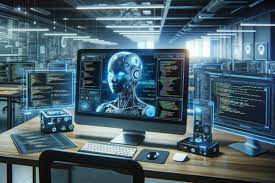StartUps
AI Will Have a Transformative Impact on Software Development in 2024


By - 24 Jan 2024 08:58 PM
Another unpleasant hallmark of 2023 is its reputation for human error in costly security breaches. Verizon’s 2023 Data Breach Investigations Report declared that the human element is prominent in 74% of all breaches.Mistakes such as privilege misuse, accidental data exposure, and falling victim to social engineering attacks stem from various human factors and the critical consequences of the compromise of secrets, lamented Ev Kontsevoy, CEO & co-founder at Teleport, developer of the Teleport open infrastructure access platform.This prevalence of issues has resulted in organizations embracing biometric hardware and identity verification. But attackers, rather than solely fixating on stealing passwords, are now actively seeking a range of secrets embedded within an organization’s infrastructure, including browser cookies, private keys, API keys, and session tokens, he offered.“To keep up with the pace of threats, organizations will recognize they must move to fully secretless authentication in 2024 to secure the wider spectrum of sensitive access points still vulnerable to threats,” Kontsevoy told TechNewsWorld. He predicted that the widespread adoption of secretless access in the coming year will create immunity to human error and significantly hamper threat actors’ operations. Kontsevoy pulls no punches in describing the changing events software developers will have to execute. A significant change will involve a historic shift in how companies approach network security. Gone will be the IT-centric strategy of dedicated security teams.
“We’ll see the role of security teams shifting to those of consultants and auditors, with engineering teams responsible for choosing vendors and implementing security protocols,” he added. “Cybersecurity teams will be responsible for policy and ensuring that workflows and systems meet security requirements.”According to Yoav Abrahami, chief architect and head of Velo at website building platform company Wix, we are in the midst of a massive information revolution sparked by OpenAI, and artificial intelligence tools will continue to augment other developer integrations, he shared.These will include innovations in DevOps, data mining, and project management. Core web vitals will become more critical, forcing developers to put more emphasis on it, he observed.“Developers are shifting from their local workstation to a cloud workstation. Those who make the leap will stay ahead of the curve,” he told TechNewsWorld.Parallels exist between AI and low-code use cases and adoptions. AI is helping organizations and individuals to analyze, interpret, and manage massive data sets, create initial drafts of content, find answers to questions, and read medical images such as X-rays, according to Digibee CTO Peter Kreslins.Legacy systems will become much less in existence in 2024. They can be described simply as systems that are in place and working.
“That is a reasonable but perhaps too charitable description. The reality is that legacy software is a substantial barrier to innovation and change,” Kreslins said.The capability of modern integration platforms to integrate legacy systems with current systems enables organizations to continue using legacy systems that perform well as part of their modern IT stack if they prefer.





![[Update] Aequs IPO: Issue Subscribed 3.4X On Day 1](https://watstrending.com/images/post_image/693058a82ccf4.webp)


















